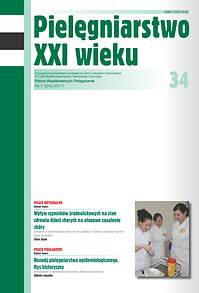“How to live”? – i.e. about ‘syncretistic ethics’ – topic relevant to education of nurses
Keywords:
ethics, philosophy, postmodernism, teaching, nursingAbstract
Should we agree with the frequent statements of still fashionable post-modernists, that centuries of considerations about ethics haven’t formulated any answer for the question “how to live?” - i.e. about ‚syncretistic ethics’.
The authors respond to the pessimistic conclusions of postmodern trend followers, who deny the idea of progress, humanism and the possibility of answering the question important to each of us: „how to live?”. The authors are convinced that the answer to this question can be expressed, if only the conclusions of various ethical schools formulated throughout centuries could be considered jointly. They make a list of former statements of earlier schools of ethics in order to obtain a kind of useful mental tool for didactic purposes and the dispute about whether mankind has been able to formulate an answer to this question. It seems that this it is sufficient advice for students of ethics.
Negative events in life of individuals and societies taking place nowadays, do not cancel the ethical value of these recommendations, because there are no relationships between the knowledge of those principles and state of mind of people who commit these events.
The authors are convinced that their listing of ethnical rules constitute a useful didactic tool. They also state what is the link of inference, where a further progress in thinking and considerations is necessary. They have in mind the only existing recommendations on the organization of democratic societies. Unfortunately there haven’t been developed any mechanisms, which could restrain the richest people from controlling the media, the institutions managing monetary policy, and even international organizations.
References
1. Michalski K.: AAA... Chcesz wiedzieć jak żyć? Nie dzwoń!, Wywiad z Krzysztofem Michalskim opublikowany w Gazecie Wyborczej z dnia 25. 03. 2010, dostępny także pod.: http://wyborcza.pl/1,76842,7700281,AAA__Chcesz_wiedziec_jak_zyc__Nie_dzwon.html
2. Wendland Z. Historia filozofii - od szkoły jońskiej do końca XX wieku - podręcznik akademicki dla nie filozofów. Wydawnictwo SGGW, Warszawa, 2003
3. Popkin R. H. Filozofia. Wydawnictwo Zysk i S-Ka, Poznań, 1994
4. Rawls J. Teoria sprawiedliwości, Wydawnictwo Naukowe PWN, Warszawa, 2010
5. Bergson H. Dwa źródła moralności i religii, Wydawnictwo: Homini, Kraków, 2007
6. Gray J. Humanizm to przesąd. Wywiad z John’em Grayem, przedrukowany z Der Spiegel przez tygodnik Forum, 2010; 46 (13): 2-5.
7. Brodziak A. Should we discuss in ‚The Internet Journal of World Health and Societal Politics’ fears and concerns related to planned ways of prevention of the epidemics of swine flu? The Internet Journal of World Health and Societal Politics. 2009, 7, 1 http://www.ispub.com/journal/the_internet_journal_of_world_health_and_societal_politics/volume_7_number_1_33/article/should-we-discuss-in-theinternet-
journal-of-world-health-and-societal-politics-fears-and-concernsrelated-to-planned-ways-of-prevention-of-the-epidemics-of-swine-flu.html]
8. Rymuszko M. Zmowa - Balon z mistyfikacją, jaką było ogłoszenie Przez Światową Organizację Zdrowia pandemii świńskiej grypy, wcześniej czy później musiał pęknąć Nieznany Świat, 2010, 232, 3-4.
Downloads
Published
Issue
Section
License
Copyright (c) 2011 Andrzej Brodziak, Agnieszka Wolińska, Ewa Ziółko (Autor)

This work is licensed under a Creative Commons Attribution 4.0 International License.




